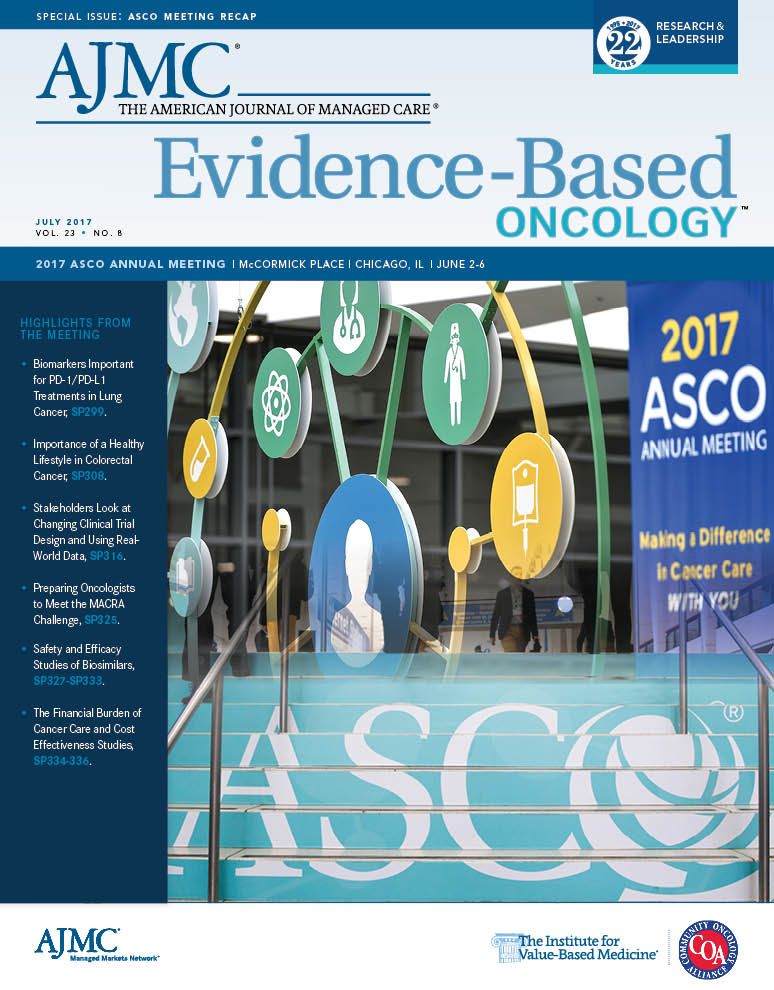- Center on Health Equity & Access
- Clinical
- Health Care Cost
- Health Care Delivery
- Insurance
- Policy
- Technology
- Value-Based Care
ASCO Study Finds Shift in Diagnosis Stage for Several Cancers Following ACA Implementation
The diagnosis of stage I disease increased for female breast cancer, colorectal cancer, and lung cancer following implementation of the Affordable Care Act (ACA), according to research presented at the 2017 American Society of Clinical Oncology Annual Meeting in Chicago.
ANALYSIS OF DATA AVAILABLE
within the National Cancer Data Base, a national hospital-based registry, showed that the diagnosis of stage I disease increased for female breast cancer, colorectal cancer (CRC), and lung cancer following implementation of the Affordable Care Act (ACA). Although early diagnosis of cervical cancer was not statistically significant, diagnosis of stage I prostate cancer saw a drop. The results were presented at the 2017 American Society of Clinical Oncology (ASCO) Annual Meeting in Chicago.1
Inadequate insurance and education have previously been identified as significant determinants of increased screening rates.2 A 2015 study, published in The American Journal of Managed Care®, found that individuals from lower socioeconomic or uninsured groups are least likely to use preventive screening.3
The current study was designed by researchers from the American Cancer Society to identify changes in stage at diagnosis following ACA implementation. The study cohort included nonelderly patients of screening-appropriate age who were diagnosed between 2013 and 2014. The prevalence of stage I disease was calculated for 5 cancer types, before (2013 Q1 to Q3) and after (2014 Q2 to Q4) the ACA.
Disease-specific distribution was as follows:
- 121,402 female breast cancer (40 to 64 years)
- 39,418 CRC (50 to 64 years)
- 11,190 cervical cancer (21 to 64 years)
- 41,436 lung cancer (55 to 64 years)
- 59,210 prostate cancer (50 to 64 years)
The analysis found a statistically significant increase in stage I disease for female breast cancer (47.8% vs 48.9%; prevalence ratio [PR] = 1.02; 95% CI, 1.01-1.03), CRC (22.8% vs 23.7%; PR = 1.04; 95% CI, 1-1.08), and lung cancer (16.6% vs 17.7%; PR = 1.06; 95% CI, 1.02-1.11) in 2014. While cervical cancer saw a nonsignificant shift to stage I disease, (47.2% vs 48.7%; PR = 1.02; 95% CI, 0.98-1.06), the percentage of stage I disease diagnosis for prostate cancer decreased (18.5% vs 17.2%; PR = 0.93; 95% CI, 0.9-0.96) in 2014.
Xuesong Han, PhD, a study co-author, explained during a press cast hosted by ASCO, that the recommendation by the US Preventive Services Task Force (USPSTF) regarding routine prostate cancer screening might have influenced the observed drop in screening rates. USPSTF’s Grade D recommendation for a routine prostate-specific antigen—based screening for prostate cancer has previously been blamed for a reduction in intermediate and high-risk prostate cancer diagnoses.
During the press cast, Han shared detailed analyses based on Medicaid expansion status in the states and concluded that the shifts to early-stage diagnosis for CRC and lung cancer were mainly seen in Medicaid-expansion states, while the shift observed for female breast cancer was independent of the states’ Medicaid expansion.REFERENCES
1. Han X, Lin CC, Jemal A. Changes in stage at diagnosis of screenable cancers after the Affordable Care Act. J Clin Oncol. 2017;35(suppl; abst 6521).
2. Dangi-Garimella S. Insurance status, race, and education remain persistent barriers to cancer screening. The American Journal of Managed Care® website. ajmc.com/newsroom/insurance-status-race-and-education-remain-persistent-barriers-to-cancer-screening. Published March 2, 2017. Accessed June 1, 2017.
3. Walsh B and O’Neill C. Socioeconomic disparities across ethnicities: an application to cervical cancer screening. Am J Manag Care. 2015;21(9):e527-e536.

Roflumilast Cream 0.05% Durable, Safe for Younger Pediatric Patients
August 15th 2025The INTEGUMENT-OLE study is an open-label extension analysis that followed a primary investigation from the phase 3 INTEGUMENT-PED trial, which investigated the efficacy and safety of once-daily roflumilast cream 0.05% for atopic dermatitis in children aged 2 to 5 years.
Read More
PCPs Have Unique Opportunity to Detect, Manage CKD
August 14th 2025As the prevalence of chronic kidney disease (CKD) continues to rise, empowering primary care providers (PCPs) with the tools, training, and collaborative frameworks needed for optimal management is a public health priority, emphasize the researchers.
Read More

